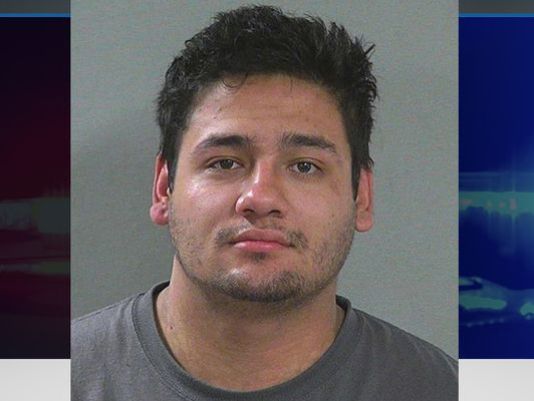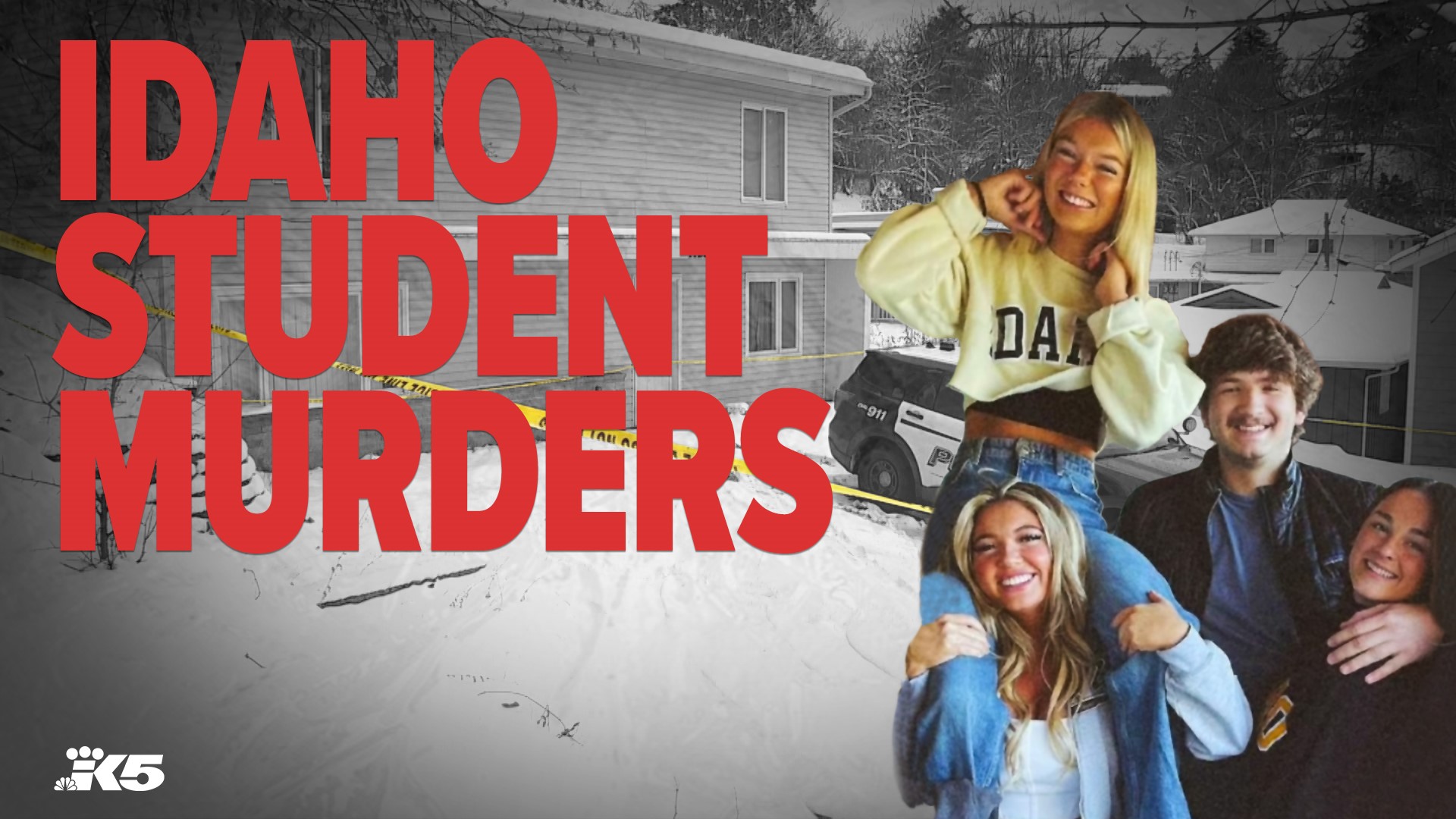![635787957506561893-635724130616285146-635671181198013347-cervantes-gfx [ID=72820368]](http://cdn.tegna-tv.com/-mm-/3d5569507733ca056af5edaf0a2a8036c559fb13/r=500x375/local/-/media/2015/09/25/KTVB/KTVB/635787957506561893-635724130616285146-635671181198013347-cervantes-gfx.jpg)
CALDWELL -- The father of a Nampa man who was beaten to death in a home invasion stared down Angelo Cervantes Friday, calling the attack that claimed his son's life "cowardly."
"To kill someone over $700 and disrespect, I don't understand that at all," Ronald Ghostwolf said.
Cervantes, 21, was sentenced to life in prison with the possibility of parole after 15 years. He admitted to first-degree murder, kidnapping and aggravated assault and agreed to testify against a codefendant as part of a plea deal.
Prosecutors say Cervantes and accomplice Raul Edgar Herrera targeted 46-year-old Jeffrey Dyer after Dyer ripped them off on a drug deal, pocketing several hundred dollars but never producing the Oxycontin pills he had promised.
Herrera and Cervantes burst into the home Dyer shared with his father in the early morning of Nov. 8. Ghostwolf, 74, was badly beaten and tied up. Dyer, who was asleep in his bedroom, was beaten to death with an extendable baton.
It's unclear which of the defendants actually dealt the killing blows: prosecutors and Cervantes both say it was Herrera, while Ghostwolf testified Cervantes, the larger of the two attackers, murdered his son.
Ghostwolf said in court that he appreciated Cervantes testifying as a witness for the prosecution in Herrera's trial and thanked him for a letter the defendant had sent him from jail.
"I absolutely respect you, Mr. Cervantes, for writing that letter, that meant a lot to me, but I absolutely can't forgive you for what you took part in at this time," he said.
Cervantes told police he believed he and Herrera were breaking into the house for a "snatch-and-grab" robbery, knocking out the home's residents and stealing narcotics or money to recoup their losses. Prosecutor Gerald Wolff said Herrera had other plans.
"We believe Mr. Herrera went there to kill - always have," he said. "We did not have that belief about Mr. Cervantes."
Wolff said the critical moment came when Ghostwolf opened his door to let his dog out into the yard and the attackers surged into the house. Herrera went in first, knocking the elderly man to the ground and hitting him again and again with a metal object. Cervantes, behind him, stepped into the home.
"That was the fateful decision that Mr. Cervantes made," Wolff said "He could have turned and ran."
Instead, the men ransacked the house looking for drugs as Dyer lay dying from his injuries. When the men realized he was dead, they rolled him up in a blanket and put him in the trunk of his own Cadillac Seville, later dumping the car and the body in the parking lot of an Ontario strip mall.
Ghostwolf said he realized Dyer was "no saint," but he did not deserve to die.
"He was my son, and even with all the problems that he had and all the things he did, I still love him," Ghostwolf said.
Both the prosecutor and defense attorney Tera Harden described Cervantes as influenced by Herrera, his more powerful, more vicious friend. If Cervantes had not been present in the West Dakota Avenue home the morning Dyer died, Herrera likely would not have left Ghostwolf alive, Wolff said.
Harden and Wolff both said drugs and addiction also contributed to the killing.
"But for the drugs and his use of drugs, we would not be here," Harden said.
Cervantes started early. He was seven years old the first time he smoked marijuana. By 12, he was injecting heroin and was hooked on opiates. By 15, he was using meth as well. Herrera and Cervantes, who grew up close as brothers, started selling drugs together in junior high.
By the time of the murder, Cervantes owed $5,000 to his friend for drugs, a debt Herrera promised to obliterate if Cervantes helped him in the robbery. They would divvy up sales proceeds from the oxycondone pills Herrera was certain were inside Dyer's house. Cervantes agreed.
"This case shows the tragedy that has befallen our community with drugs and violence," Wolff said, arguing Cervantes was sucked into a drug subculture that exalted status and acting tough.
The tough act came apart in a Nampa Police Department interview room about a month later. Police had found the body and a tipster had linked Cervantes and Hererra to the murder. Cervantes knew it was over, Wolff said.
"He knew he was done, he knew he was going to prison," he said.
With no lawyer, and no assurance of reduced charges or a plea deal, Cervantes spilled everything. He led detectives to where he and Herrera had burned their bloody clothes and thrown away the bent baton used to kill Dyer. He told police about his involvement and asked to talk to Herrera, encouraging him to confess as well.
The prosecutor said Cervantes chose to cooperate even though he knew the dangers that accompany going to prison labeled a "snitch." Wolff and Harden both urged the judge to stick to the terms in the plea deal - 15 to life - and not hand down a stiffer fixed sentence.
"He does not have the cold, hardened heart. He really doesn't," Wolff said.
Cervantes cried during his statement to the court, in which he apologized to Dyer's family and his own. He said he tried to turn his life around after previous run-ins with the law.
"By the time I wanted to change, it was hard. It was really hard," he said. "I went back to what I knew what to do, which led to even worse decisions that landed me in a big hole that I couldn't get out of."
Cervantes said he wished he had done things differently and addressed Dyer's father in the gallery.
"To Mr. Ghostwolf, I am so sorry for all this," he said. "If I could trade places with your son I would in a heartbeat."
Judge Juneal Kerrick said she had struggled to determine an appropriate sentence, and had not slept at all the night before.
"There are so many things about this case that are heartbreaking," she said.
The 15-year fixed sentence was lower than what she would have considered in a similar case, she said. Kerrick said that although Cervantes' willingness to cooperate with law enforcement was commendable, no amount of prison time could undo the damage to Dyer's family.
"It's a very, very big price to pay, but appropriately so," she said. "You can never have the right number: No number can ever replace what's been taken."


